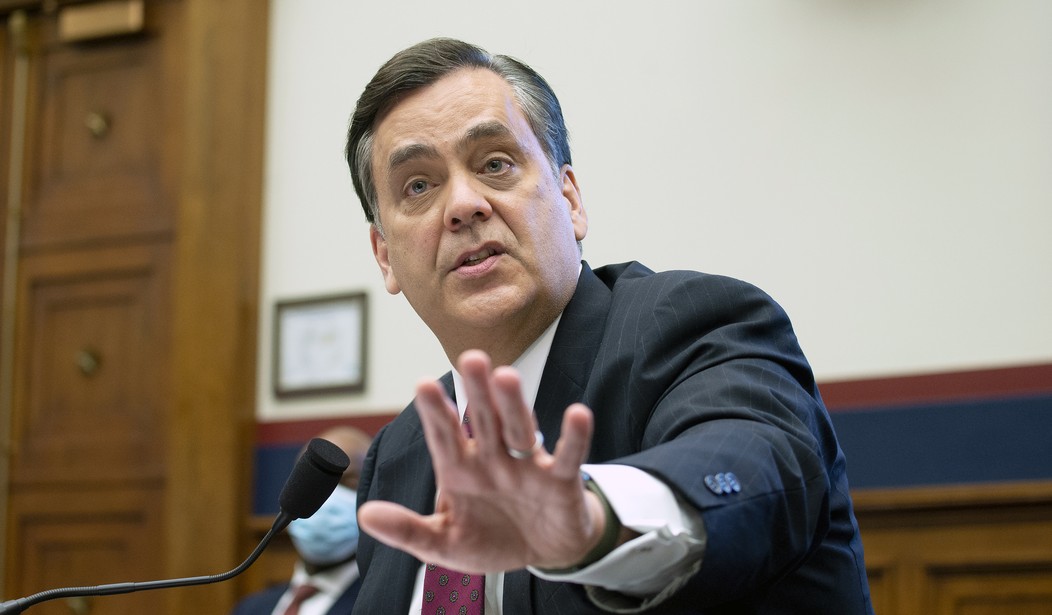While the radical left is celebrating a guilty verdict for Trump for a non-crime, George Washington University Law School professor Jonathan Turley is throwing cold water on their celebrations because, as he points out, the Trump trial was "a target-rich environment for an appeal, with multiple layers of reversible error."
"The problem was not the jury,” he insists, "but the prosecutors and the judge."
According to Turley, "the most compelling problems” are the judge, the charges, the evidence, and the instructions.
First, there’s Judge Juan Merchan, who was specifically chosen for this case, continuing a pattern of tough rulings against Trump and his organization. Merchan, as we’ve noted before, has not only donated to Joe Biden’s campaign, but to anti-Trump and anti-GOP groups. His bias has long been established. His daughter is a Democratic organizer who raises funds against Trump and the GOP. Legal experts repeatedly observed that Merchan's rulings were pro-prosecution. Turley, who got to observe Merchan in court, noted that his decisions often seemed incomprehensible and conflicted.
Of course, the next problem was the charges."The Justice Department declined any criminal charges against Trump under federal election law over the alleged 'hush money’ payments,” Turley writes. "The Federal Election Commission likewise found no basis for a civil fine. With no federal prosecution, Bragg decided to use an unprecedented criminal theory not only to zap a dead misdemeanor into life (after the expiration of the statute of limitation) but to allow him to try violations of not only federal election law but also federal taxation violations."
Related: Joe Biden Trusts A Justice System That Has Protected Him and His Family
Even the charges themselves were confusing to experts because the actual crime Bragg was alleging wasn’t clear. "The indictment claimed a violation under New York’s election law 17-152 that the falsification of business records were committed to further another crime as an unlawful means to influence the election,” he points out. "However, in a maddeningly circular theory, that other crime could be the falsification of business records. It could also be violations of federal election and taxation laws, which Trump was never charged with, let alone convicted of."
And then there’s the problem with the evidence.
“Judge Merchan allowed a torrent of immaterial and prejudicial evidence to be introduced into the trial by the prosecution. That included testimony from porn actress Stormy Daniels that went into details about having sex with Trump,” Turley writes. "She included a clear suggestion that Trump raped her. After this utterly disgraceful testimony, Merchan expressed regret but actually blamed the defense counsel, despite their prior objections to the testimony."
Turley pointed out that Merchan had previously scolded the defense for making repeated objections, but now he was criticizing them for not making an objection. He also said that Merchan's decisions were “conflicted."
He allowed the introduction of Michael Cohen's plea agreement and David Pecker's non-prosecution agreement to federal election violations, but only for credibility and context, instructing the jury not to use them to establish Trump's guilt.
Despite this, prosecutors declared it a fact that Trump ordered federal election violations and had witnesses like Cohen support this claim. Merchan overruled objections that prosecutors were undermining his instructions. He also barred former FEC Chair Brad Smith, a legal expert, from testifying that such payments couldn't be considered federal election violations. Although courts can decide what the law is for the jury, Merchan failed to clarify the law and permitted the jury to hear repeated false claims that the payments were campaign contributions.
Related: Trump Rakes in Massive Campaign Donations 24 Hours Post-Verdict
And finally, there’s the jury instructions. As Turley explains, despite numerous reversible errors a hung jury seemed possible, until Merchan gave his instructions to the jury—which seemed engineered to ensure a guilty verdict. The jury was permitted to conclude that the secondary offense could be any of three vaguely defined options without specifying which crime they found. Thus, the jury could have split 4-4-4 among conspiracy to conceal a federal election violation, falsification of business records, or taxation violations. This lack of clarity means Trump will never know the specific crime he was convicted of.
"These are just a few of the appellate issues,” Turley says. "There are other challenges, including but not limited to due process violations on the lack of specificity in the indictment, vagueness of the underlying state law and the lack of evidentiary foundation for key defenses like 'the legitimate press function.’"
"They are the reason why many of us view this case is likely to be reversed in either the state or federal systems,” he says.










Join the conversation as a VIP Member